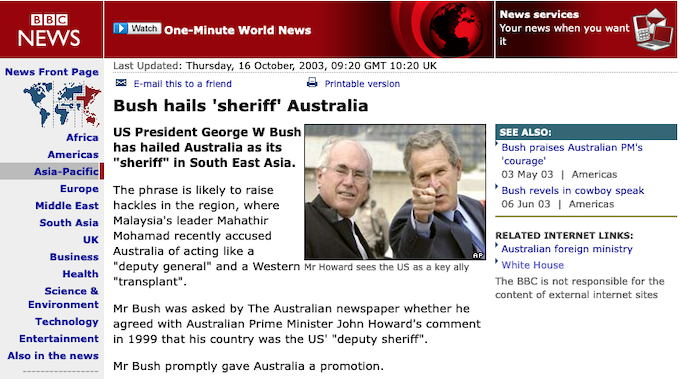THE VILLAGE EXPLAINER: By Dan McGarry
If the coming election goes to Australia’s Labor party, Penny Wong is very likely to become Foreign Minister. So when she speaks, people across the region prick up their ears.
Without the least disrespect to her recent forebears, she could be one of the most acute, incisive and insightful FMs in recent history.
Whether she’ll be any more effective than them is another matter.
- READ MORE: Sogavare adamant deal with China won’t undermine regional security
- Other China security pact reports
Australia has a long tradition of placing prominent front-benchers into the role, and then pointedly ignoring their efforts, their advice and their warnings. It’s as if government leaders find their greatest rival and send them trotting off around the globe, more to keep them from making mischief at home than to achieve anything noteworthy while they’re gone.
In Australia, it seems, foreign policy is domestic policy done outdoors.
If she achieves nothing more, Wong would be well served to look closely at the people supporting her, and to spend considerable effort re-organising and in fact re-inventing DFAT.
Its disconnection from other departments, especially Defence and PMO, has created an internal culture that spends more time feeding on itself than actually helping produce a persuasive or coherent foreign policy.
Ensuring foreign policy’s primacy at the cabinet table is a big ask, but it will be for naught if the department can’t deliver. There are significant structural matters to be dealt with.
‘Worst failure of foreign policy in the Pacific’: Labor launches scathing attack on government over Solomon Islands-China pact https://t.co/efbU2tM6Iu
— ABC News (@abcnews) April 19, 2022
Rolling development and aid into the department was a significant regression that hampered both sides. Volumes can be written about the need to distinguish development assistance from foreign policy, and many of them could be focused on the Pacific islands region.
The two are mostly complementary (mostly), but they must also be discrete from one another.
It’s far more complicated than this, but suffice it to say that development aid prioritises the recipient’s needs, while foreign relations generally prioritise national concerns. The moment you invert either side of that equation, you lose.
Exempli gratia: Solomon Islands.
It’s well known that Australia spent billions shoring up Solomon Islands’ security and administrative capacity. Surely after all that aid, they can expect the government to stay onside in geopolitical matters?
Applying the admittedly simplistic filter from the para above, the answer is an obvious no.
Aid is not a substitute for actual foreign relations, and foreign relations is definitely not just aid.
So is Penny Wong correct when she calls the CN/SI defence agreement a massive strategic setback? Sure.
Is she right to call Pacific Affairs Minister Zed Seselja “a junior woodchuck”, sent in a last minute attempt to dissuade Prime Minister Manasseh Sogavare from signing the agreement?
The idea of a minister responsible for the complex, wildly diverse patchwork of nations spanning such a vast space has value. But in terms of resources and policy heft, Seselja rides at the back of the posse on a mule.
There are good reasons to devote an entire office to Pacific affairs. There are also blindingly good reasons to keep the Foreign Minister as the primary point of contact on matters of foreign policy.
That means the role—and yes, the existence—of the Pacific Affairs ministry needs a ground-up reconsideration. Notionally, it fulfills a critical role. But how?
It’s fair to say that Wong is more insightful than those who describe Solomon Islands as a fly-speck in the Pacific, or a Little Cuba (whatever the F that means). But in the past, Labor’s shown little insight into the actual value and purpose of foreign policy.
For the better part of four decades, neither Australian party was fussed at all about the fact that there had been few if any official visits between leaders. Prime Ministers regularly blew off Pacific Islands Forum meetings.
In Vanuatu’s case, the first ever prime ministerial visit to Canberra was in 2018. Why aren’t such meetings annual events?
Australia is rightly proud of its pre-eminence in development assistance in the Pacific islands. But that never was, and never will be, a substitute for diplomatic engagement. And you can’t have that without a functioning diplomatic corps whose presence is felt equally in Canberra and in foreign capitals.
But even that’s not enough. Penny Wong has yet to show in concrete terms how she plans to address what could accurately be called the greatest strategic foreign policy failure since WWII: Leaving Australia alone to guard the shop.
In 2003, George W. Bush was rightly vilified for characterising Australia’s role in the region as America’s Sheriff.

But the Americans weren’t the only ones who walked away, leaving Australia alone to engage with the region. The UK and the EU (minus France in their patch) rolled back their diplomatic presence substantially.
Even New Zealand agreed to restrict its engagement in large areas in deference to its neighbour. The most enduring presence was provided by organisations without any meaningful foreign policy role: UN development agencies and multilateral financial institutions.
Since the beginning of the War on Terror, there has been a consistent and often deliberate draw-down on the capital provided by democratic institutions, multilateral foreign policy, and indeed any collective course-setting among nations.
Post Cold-War democratic momentum has been squandered on an increasingly transactional approach to engagement that’s begun to look alarmingly like the spheres of influence that appeal so much to Putin and Xi.
This hasn’t happened in the Pacific islands alone. The UN has become an appendix in the global body politic, one cut away from complete irrelevance. ASEAN and APEC are struggling just as hard to find relevance, let alone purpose, as the Pacific Islands Forum or the Melanesian Spearhead Group.
Australia has “led” in the Pacific islands region by being the largest aid donor, blithely assuming that all the other kids in the region want to be like it. But that “leadership” masks a massive gap in actual influence in shaping the agenda in a region that’s larger and more diverse than any other in the world.
Want to know more? I have a whole chapter in my last book about it: https://t.co/RjggiClW5Z
— Joanne Wallis (@JoanneEWallis) March 30, 2022
The data’s there if people want it. This isn’t a particularly contentious… er, contention, if you’re among the far-too-small group of people who actually live in and care about the future of the region.
In a regional dynamic defined and dominated by transactional bilateralism, China holds all the aces. The only hope anyone has of slowing its growth in the region is through meaningful multilateralism that treats Pacific island countries as actual nations with national pride and individual priorities. Instead of silencing them, their voices should be amplified and defended, not by Australia alone, but by every other democratic nation with the means and the will to do so.
If we can’t respect the equal standing of nations, we can’t protect their integrity.
Scott Morrison may indeed be one of the worst exemplars of this blithe disregard for actual foreign policy engagement. He’s certainly won few friends with his world-class foot-dragging on climate change. America’s suddenly renewed interest in the region is an indication that they’ve woken up to the Bush administration’s mistakes.
It’s also clear they don’t trust Australia to play Sheriff any more. Kurt Campbell’s upcoming visit to the region is just the latest in a series of increasingly high profile tours of the region.
So yes, Penny Wong is justified in saying that China’s advances in the Pacific derive at least in part from Australia’s lack of a coherent and effective foreign policy.
But foreign policy is not made at home. It’s not Australia’s interests alone that matter. And subjugating Pacific nations in compacts of free association isn’t a substitute for actual policy making.
Pacific island nations will not defend Australia’s national interests unless they share those interests. The only way that Australia—and the world—can be assured they do is by actively listening, and by incorporating Pacific voices into the fabric of a renewed and revitalised global family.
Dan McGarry was previously media director at Vanuatu Daily Post/Buzz FM96. The Village Explainer is his semi-regular newsletter containing analysis and insight focusing on under-reported aspects of Pacific societies, politics and economics. His articles are republished by Asia Pacific Report with permission.












































